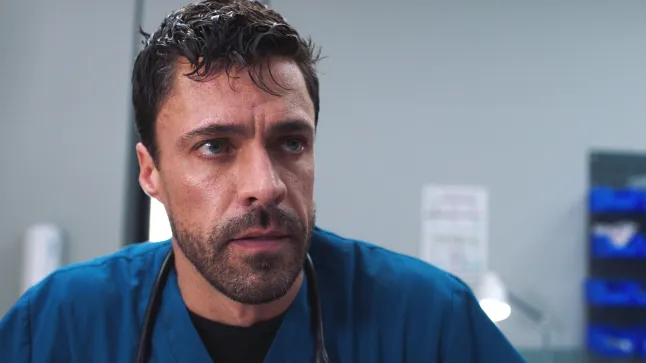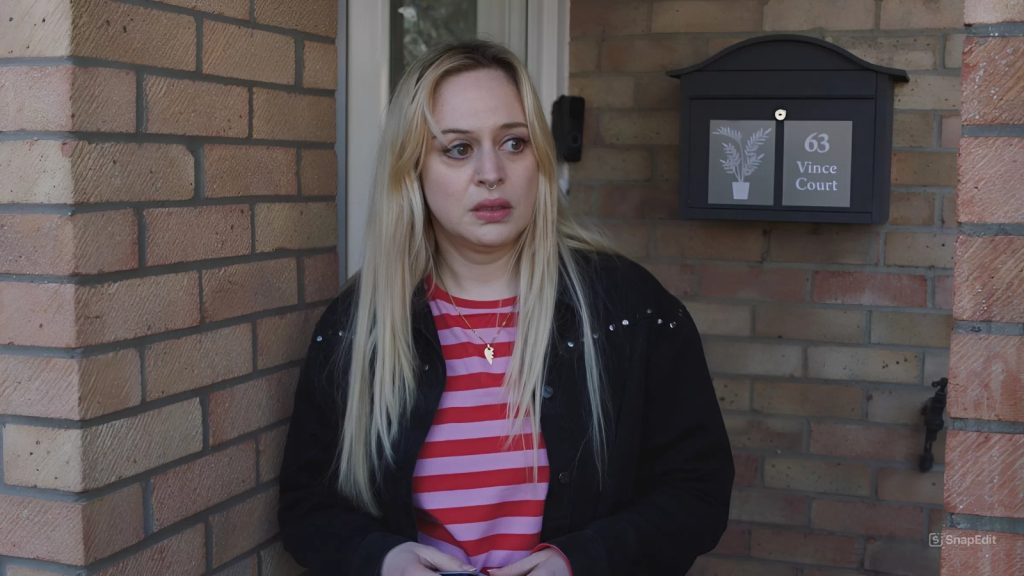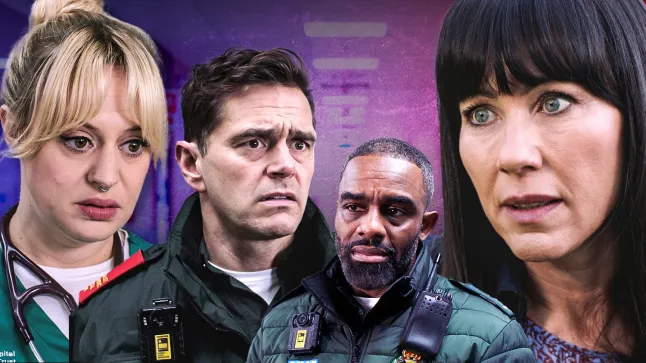In a truly heart-wrenching and pivotal episode of the acclaimed BBC medical drama Casualty, viewers were captivated by the profound ordeal of Nurse Alicia Munroe, portrayed with unparalleled depth by Chelsea Halfpenny. Titled “Supply and Demand,” this installment was a masterful display of dramatic tension and emotional complexity, leaving an indelible mark on its audience and profoundly testing Alicia’s resolve, her relationships, and her very spirit. The narrative unfolded against the familiar, yet suddenly menacing, backdrop of the Holby City Emergency Department (ED), pushing its dedicated staff to their absolute limits and forcing an ethical dilemma of shattering proportions upon one of its most compassionate nurses.
The episode commenced with the characteristic hustle and bustle of the ED, but an almost palpable air of tension hinted at the turmoil to come. Alicia was visibly grappling with the raw aftermath of her recent, painful split from Dr. Ethan Hardy, played by George Rainsford. Their relationship, once a rare beacon of hope and stability amidst the ED’s relentless chaos, had crumbled under the weight of irreconcilable differences concerning family and future. Central to their separation was Ethan’s profound struggle with Huntington’s disease, a degenerative neurological condition that led him to the agonizing decision not to have children to avoid passing on the gene. This personal tragedy had left Alicia deeply scarred, her emotional vulnerability starkly evident as she struggled to maintain her professional composure. Her personal heartache was etched clearly on her face, making her even more susceptible to the emotional pressures that were about to engulf the department. This pre-existing emotional fragility added another crucial layer of complexity to the unfolding events, highlighting how deeply personal struggles can intertwine with professional demands in a high-stakes environment like the emergency department.
The Holby ED was then plunged into an unprecedented level of chaos following a catastrophic incident: a lorry carrying hazardous chemicals overturned on a nearby motorway, triggering a massive explosion and an overwhelming surge of casualties. The sheer scale of the disaster meant a continuous stream of critically injured patients, stretching the staff to their absolute limits and pushing an already strained system to its breaking point. Medical professionals, typically adept at managing high-pressure situations, found themselves operating in a frantic, almost apocalyptic landscape. Every bed was filled, every available hand was on deck, and resources began to dwindle rapidly. Amidst the pandemonium, a young boy was brought in, tragically separated from his family and critically injured, his life hanging precariously in the balance. Despite her own profound personal turmoil and the overwhelming nature of the situation, Alicia, known for her deeply empathetic nature and strong maternal instincts, was instinctively drawn to his side. She felt an immediate, overwhelming need to protect him, her compassion overriding her emotional distress as she vowed to do everything in her power to save him, no matter the cost.

As the episode progressed, the emotional stakes escalated dramatically. Alicia, driven by an unwavering determination to secure the vital medication needed to save the young boy’s life, found herself in a desperate and increasingly tense standoff with hospital management. The critical drug, a specialized antidote essential for countering the effects of the chemical exposure, was in severely short supply across the region. Compounding the crisis, the hospital had controversially reserved the last available dose for a VIP patient, a politically connected figure whose status placed them above the common patient in the eyes of the administration. This forced Alicia into an agonizing and seemingly impossible choice: uphold protocol and let the boy succumb to his injuries, or defy the system to save him. Her desperation was heart-breaking, her impassioned pleas echoing through the hospital corridors as she fought fiercely for the life of a child she had only just met. Chelsea Halfpenny’s portrayal of Alicia’s anguish during these scenes was nothing short of extraordinary, her raw, unfiltered emotion resonating profoundly with viewers and drawing them deeper into the escalating drama. This narrative thread skillfully underscored the profound ethical dilemmas healthcare professionals often face, balancing individual patient needs against broader systemic pressures and resource limitations within the healthcare system, especially when those systems appear to prioritize status over life.
The ripple effects of Alicia’s desperate actions reverberated throughout the ED, placing her colleagues in an unenviable position. They were torn between their professional duties to uphold protocol and their personal loyalty and empathy for their friend. Dylan Keogh, played by William Beck, found himself particularly caught in the middle. As Clinical Lead, his deep admiration for Alicia’s unwavering passion and dedication to her patients clashed directly with his professional responsibility to maintain hospital policy and order, particularly in such a volatile and high-stakes environment. Their complex relationship, a nuanced blend of professional camaraderie, underlying tension, and mutual respect, added another compelling layer of intrigue to the episode. Their interactions were charged with the weight of unspoken feelings and difficult choices, as Dylan grappled with how to support Alicia without compromising his own position or the hospital’s already fragile stability. This dynamic powerfully showcased the human cost of such dilemmas, not just for the individual directly involved, but for the entire team operating under immense pressure and moral conflict, forcing each member to confront their own sense of right and wrong.
As the episode surged towards its gripping climax, Alicia’s desperation reached its absolute breaking point. With every conventional avenue exhausted and the boy’s condition rapidly deteriorating, she made a truly audacious move that left viewers gasping. In a profound act of self-sacrifice, she knowingly risked her entire career, her professional reputation, and potentially her personal freedom to acquire and administer the life-saving medication the young boy so desperately needed. The scene was a tour de force of dramatic tension, Alicia’s hands visibly trembling as she administered the drug, her eyes filled with tears as she whispered a heartfelt apology to the boy, a silent prayer that her radical actions would ultimately save him rather than condemn her. This pivotal moment encapsulated the series’ recurring theme of blurring lines between rigid rules and profound humanity, forcing characters and viewers alike to confront what truly matters in the face of life and death.
The immediate aftermath of Alicia’s defiant act sent shockwaves through the Holby City Hospital. While the young boy’s life was indeed saved, a profound sense of foreboding settled over Alicia’s future. The hospital management, keen to assert authority and maintain order, immediately launched a full investigation into her conduct. This led to her temporary suspension, pending a formal disciplinary hearing that threatened to strip her of her nursing license – the very profession to which she had dedicated her life. The professional repercussions deeply affected her already strained relationship with Ethan, who, despite his personal feelings, struggled to reconcile her actions with the strict adherence to protocol demanded by their shared profession. For Dylan, the situation was equally complex; while he privately understood Alicia’s motivations, his position as Clinical Lead forced him to distance himself professionally, creating a palpable tension between them. This monumental decision, though born of pure compassion, ultimately proved to be a turning point in Alicia’s career at Holby. The burden of the impending hearing, coupled with the profound emotional toll of the incident and the ongoing grief over her relationship with Ethan, eventually led to her agonizing decision to leave Holby City. Alicia Munroe’s sacrifice in “Supply and Demand” stands as a poignant reminder of the immense pressures faced by healthcare professionals and the extraordinary lengths to which compassion can drive individuals, even at the cost of their own personal and professional well-being.


